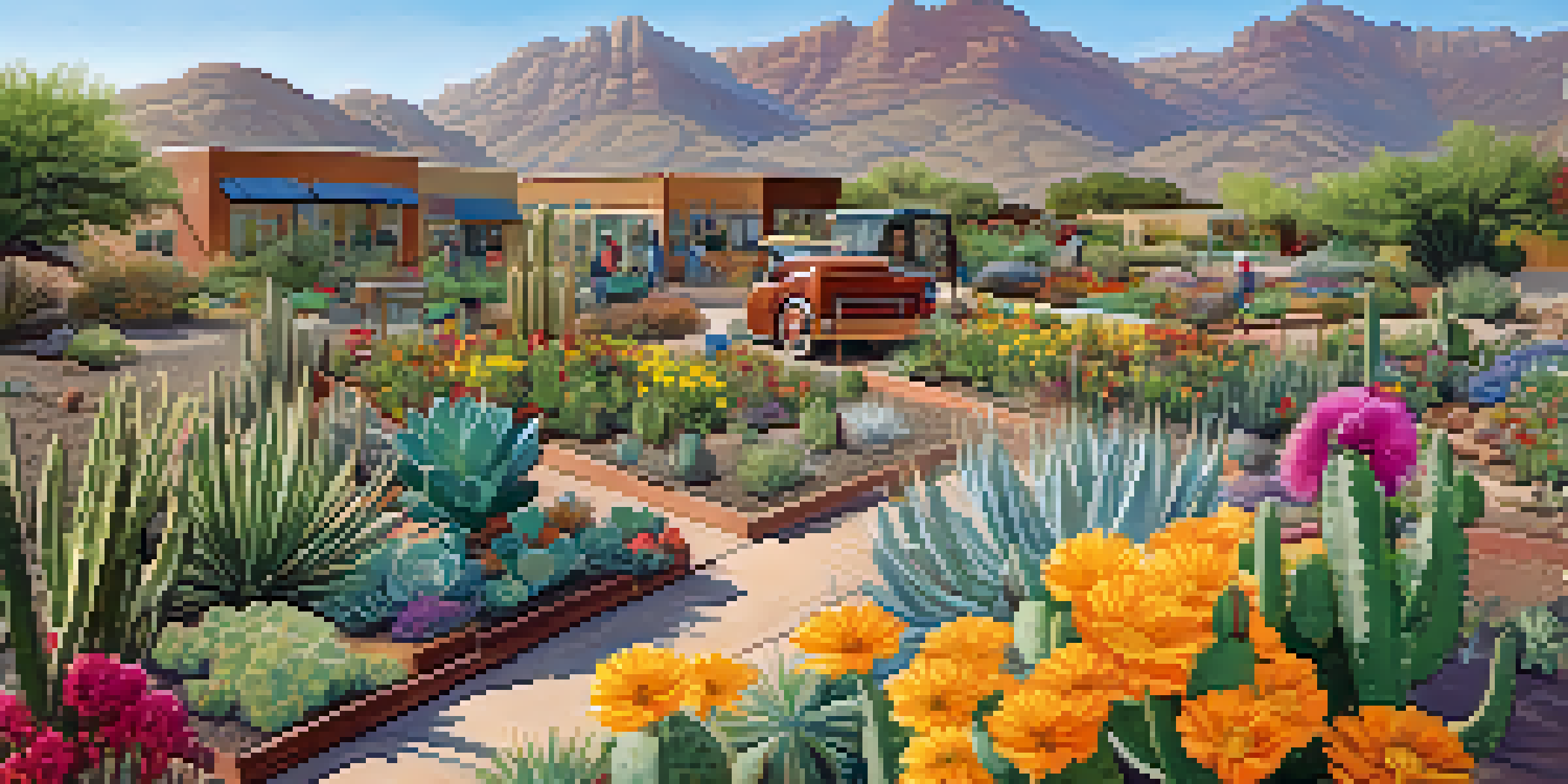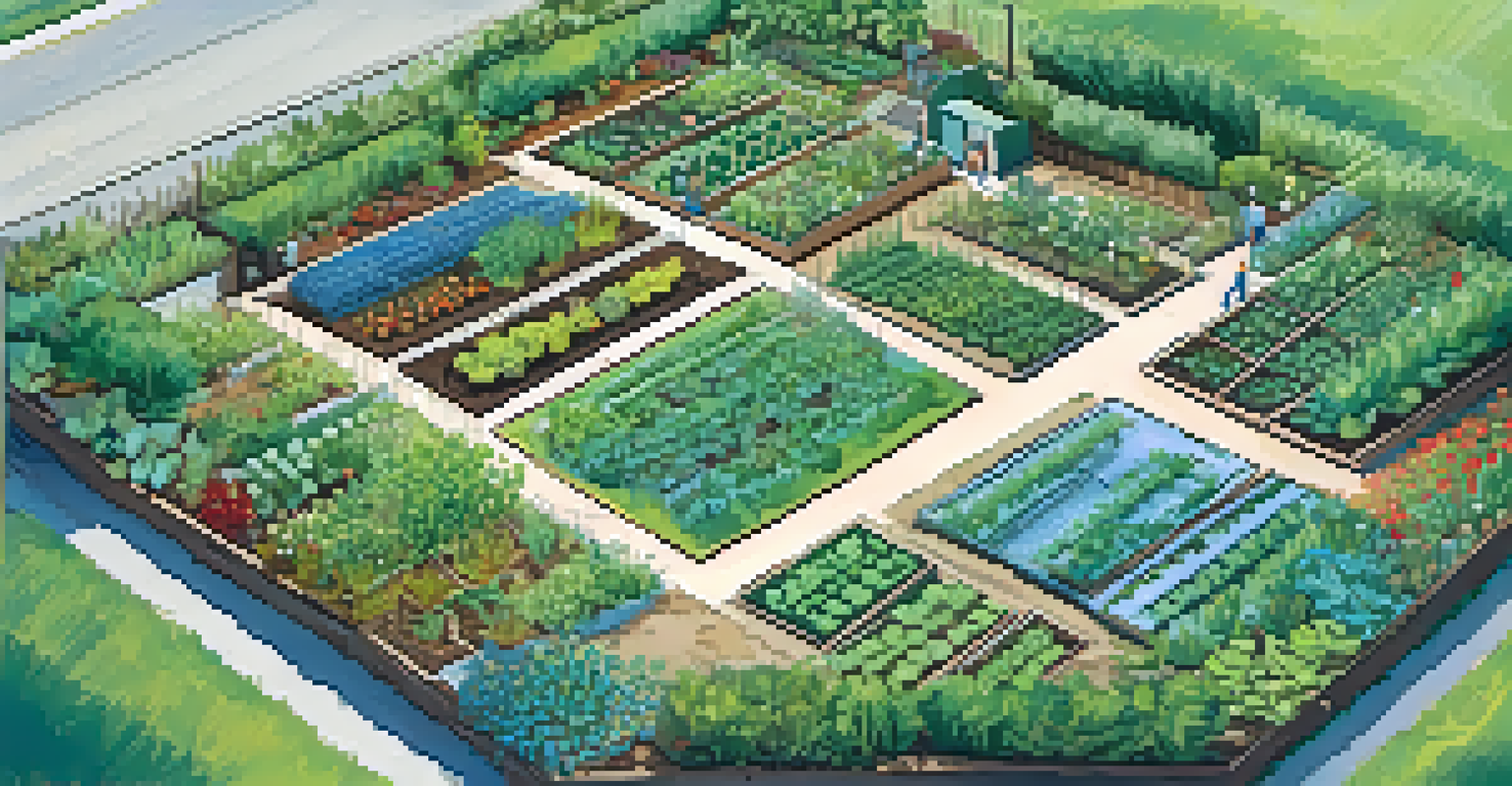Sustainable Practices in Arizona's Community Gardens

Introduction to Arizona's Community Gardens and Sustainability
Arizona's community gardens are more than just patches of green; they embody a movement towards sustainability. These gardens are vital spaces where people come together to grow food, foster community, and promote environmental awareness. By implementing sustainable practices, these gardens not only provide fresh produce but also help conserve resources and support biodiversity.
The greatest threat to our planet is the belief that someone else will save it.
Sustainability in community gardens goes beyond organic gardening; it involves a holistic approach to environmental stewardship. This means using eco-friendly materials, conserving water, and incorporating native plants that thrive in the local climate. As a result, these gardens serve as educational hubs, teaching community members about the importance of sustainability and how they can contribute.
With an arid climate, Arizona poses unique challenges and opportunities for sustainable practices. Understanding these local conditions allows gardeners to adapt their methods, ensuring that their efforts are both effective and environmentally responsible. This article will explore various sustainable practices utilized in Arizona's community gardens, highlighting their benefits and real-world applications.
Water Conservation Techniques in Community Gardens
Water conservation is critical in Arizona, where water scarcity is a significant concern. Many community gardens have adopted innovative techniques like drip irrigation and rainwater harvesting to maximize water efficiency. These methods not only reduce water waste but also ensure that plants receive the moisture they need to thrive, even in the hot desert climate.

Drip irrigation systems deliver water directly to the plant's roots, minimizing evaporation and runoff. This targeted approach not only conserves water but also improves plant health, leading to more robust yields. Additionally, collecting rainwater in barrels allows gardeners to utilize natural precipitation, reducing reliance on municipal water supplies.
Sustainable Practices in Gardens
Arizona's community gardens implement sustainable practices like water conservation and soil health to promote environmental stewardship.
These water conservation practices not only help individual gardens flourish but also contribute to the overall sustainability of the community. By sharing knowledge and resources, garden members can collectively make significant strides in preserving this precious resource for future generations.
Soil Health and Composting Initiatives
Healthy soil is the foundation of any successful garden, and many Arizona community gardens prioritize soil health through composting. Composting not only reduces waste but also enriches the soil, providing essential nutrients for plants. By composting kitchen scraps and yard waste, gardeners can create a sustainable loop that benefits both their gardens and the environment.
We won’t have a society if we destroy the environment.
Community gardens often host workshops to educate members on effective composting techniques. From vermicomposting with worms to creating hot compost piles, these hands-on sessions empower individuals to take charge of their garden's soil health. As a bonus, using locally sourced compost reduces the need for chemical fertilizers, which can harm the ecosystem.
Furthermore, healthy soil supports a diverse range of microorganisms that promote plant growth and resilience. By fostering a rich soil ecosystem, community gardens can enhance biodiversity, making them not only productive but also vital to local wildlife and pollinators.
Native Plants and Biodiversity in Community Gardens
Incorporating native plants into community gardens is a sustainable practice that supports local ecosystems. Native plants are adapted to the local climate and soil, requiring less water and maintenance than non-native species. By prioritizing these plants, gardeners can create vibrant habitats that attract pollinators and other beneficial wildlife.
Community gardens that feature native plants often see an increase in biodiversity, which is crucial for a healthy environment. These plants provide food and shelter for various insects, birds, and small mammals, fostering a thriving ecosystem. Moreover, they help prevent soil erosion and improve overall soil health, making the garden more resilient.
Education and Community Engagement
Workshops and events in community gardens foster education and community engagement, empowering individuals to make informed decisions about sustainability.
By educating community members about the importance of native plants, gardens can inspire a wider appreciation for local flora and fauna. This connection to nature not only enriches the gardening experience but also encourages stewardship of the environment beyond the garden's borders.
Community Engagement Through Education and Workshops
Community gardens in Arizona are not just about growing food; they also focus on education and engagement. Many gardens host workshops and events that teach sustainable gardening practices to the public. These gatherings foster a sense of community, where individuals can share their experiences and learn from one another.
Topics covered in these workshops range from organic gardening techniques to cooking demonstrations using garden produce. By making sustainability accessible, community gardens empower individuals to make informed choices about their food sources and environmental impact. This knowledge transfer cultivates a culture of sustainability that extends beyond the garden.
Furthermore, involving local schools and families in these educational initiatives helps instill a sense of responsibility towards the environment in younger generations. As kids learn the importance of sustainable practices, they become advocates for the planet, ensuring that the values of conservation continue to thrive.
Permaculture Principles in Arizona's Community Gardens
Permaculture is a design philosophy that emphasizes working with nature rather than against it. Many Arizona community gardens incorporate permaculture principles to create sustainable and self-sufficient ecosystems. By designing gardens that mimic natural habitats, they can reduce labor and resource input while maximizing productivity.
Key permaculture practices include companion planting, where different crops are grown together to enhance growth and deter pests. This method not only optimizes space but also fosters a balanced ecosystem within the garden. Additionally, incorporating elements like swales and mulching helps manage water effectively, minimizing erosion and improving moisture retention.
Challenges and Future Growth
Despite facing challenges such as funding and water scarcity, Arizona's community gardens are finding innovative solutions to enhance sustainability and resilience.
As more community gardens adopt permaculture strategies, they demonstrate the potential for sustainable food production in arid regions. These practices not only benefit individual gardens but also serve as a model for larger agricultural initiatives, promoting resilience in the face of climate change.
Challenges and Future of Sustainable Community Gardening
While Arizona's community gardens are making strides in sustainability, they face challenges that require innovative solutions. Issues such as limited funding, water scarcity, and community engagement can hinder the growth of these initiatives. However, many gardens are finding creative ways to overcome these obstacles and continue their vital work.
Collaborative efforts, such as partnerships with local businesses and non-profits, can provide much-needed resources and support. Additionally, engaging the community through volunteer days and fundraising events fosters a sense of ownership and pride in the gardens. By building strong community ties, gardens can enhance their sustainability and resilience.

Looking to the future, the potential for sustainable community gardening in Arizona is immense. With continued dedication to education, collaboration, and innovative practices, these gardens can thrive and inspire others to adopt sustainable methods, creating a more sustainable food system for all.